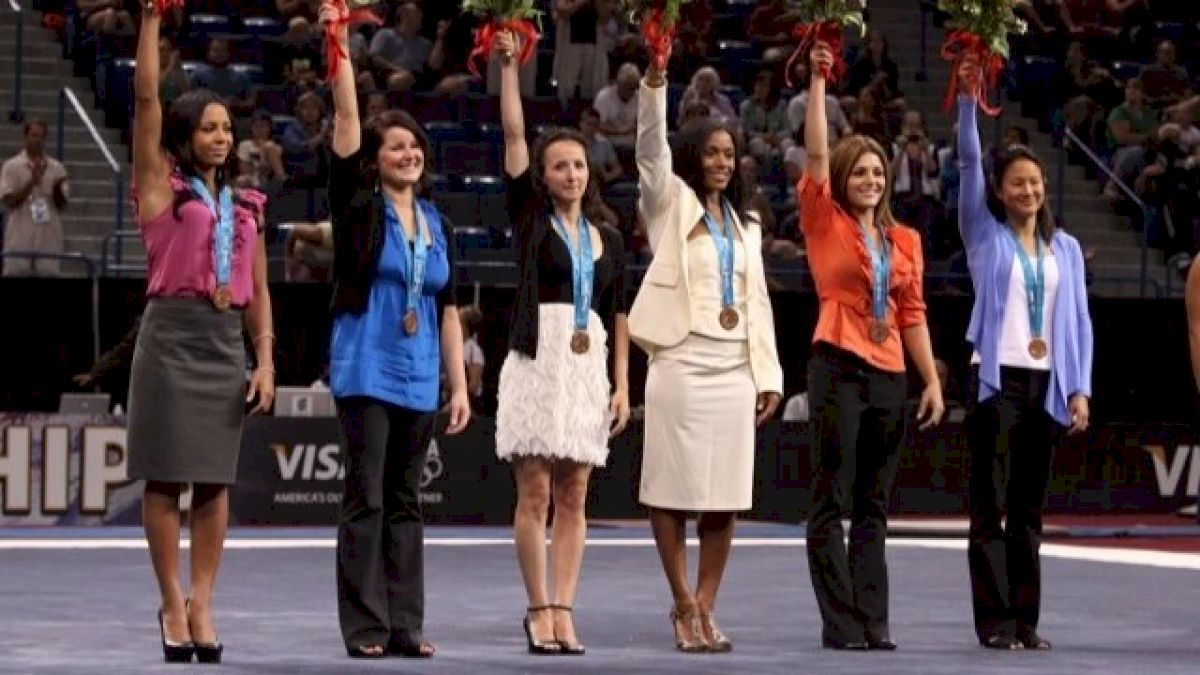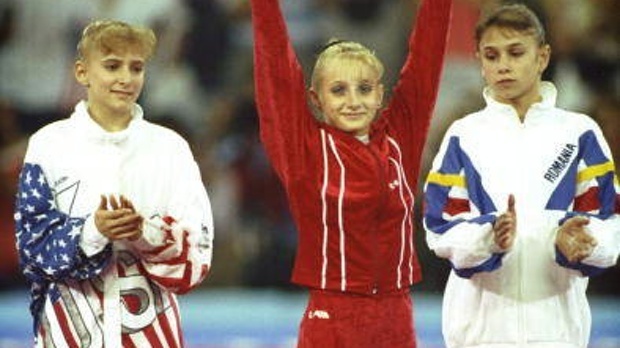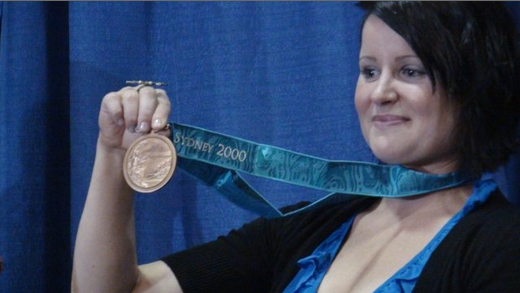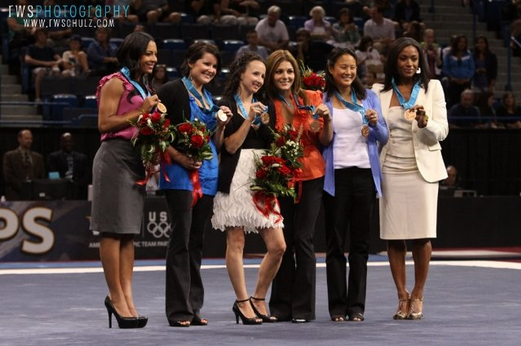Our Favorite Debatable Moments in Gymnastics History - Part 1
Our Favorite Debatable Moments in Gymnastics History - Part 1
Competitive sports routinely overflow with passion and fervor, but sometimes the pursuit for athletic prestige clouds the desire for fair play. Officiating schemes, doping dramas, and pure lying all got dragged out when we asked our Twitter Feed for their

Competitive sports routinely overflow with passion and fervor, but sometimes the pursuit for athletic prestige clouds the desire for fair play. Officiating schemes, doping dramas, and pure lying all got dragged out when we asked our Twitter Feed for their favorite gymnastics controversies. We compiled your list and added a few of our own to select our favorite controversies in Olympic gymnastics history. So take a seat, or take a side as we rummage through the gymnastics dirty laundry in this three part series.

Shannon Miller, Tatiana Gutsu, and Lavinia Miloscovici during the all around medal ceremony at the 1992 Barcelona Olympics.

Elise Ray with her bronze medal from the Sydney Olympic Games in 2010.

The American Team receiving their bronze medals 10 years after the Sydney Games.
Barcelona Bickerings

Shannon Miller, Tatiana Gutsu, and Lavinia Miloscovici during the all around medal ceremony at the 1992 Barcelona Olympics.
First on the chopping block is the highly disputed 1992 Olympic All Around Final that resulted in a show-down between American Shannon Miller and Ukranian Tatiana Gutsu representing the Unified Team. After a fierce competition, Gutsu claimed the all around title by .012 tenths, the smallest victory margin in the history of the sport. Although Miller contributed nearly flawless routines the entire night with her lowest score coming from the vault with a 9.837, judges attribute Gutsu taking the gold because of her impressive difficulty.
A close race to begin with, tension mounts when considering that Gutsu originally did not even qualify to the All Around Final. A fall on the beam in prelims prevented Gutsu from finishing in the top three of her team which kept her from advancing. However, the Unified Team pulled Roza Galieva from the all around competition, so that Gutsu could take her spot and compete in the all around final as they knew the high potential Gutsu brought to winning the entire competition. At the time, no rule existed to prevent the Unified Team from performing the substitution, but it did spark a fire in the gymnastics world and the debate rages on today.
Sydney Squabbles

Elise Ray with her bronze medal from the Sydney Olympic Games in 2010.
The 2000 Sydney Olympics deserve a category all their own as they provide a hot-bed for both gymnastics controversy and conspiracy. Take a deep breath as we dive into the depths that are the Sydney Olympics.
Romanian Andreea Raducan competed well in the team final helping Romania secure a gold. She also qualified herself to the floor, vault, and all around final. It is the all around final that provokes the most debate. Romania swept all of the podium spots in the all around final with Raducan on top followed by teammates Simona Amanar and Maria Olaru taking silver and bronze respectively. A successful sweep for Romania quickly soured when the International Olympic Committee (IOC) accused Raducan of doping a few days after the competition. The IOC discovered pseudoephedrine in Raducan's system, a banned substance at the time. The Romanian Gymnastics Federation protested that Raducan took the drug to combat a cold, and Raducan stated that if anything the drugs made her feel dizzy and inhibited her performance. Additionally, as a minor, Romania felt Raducan should not be held accountable for her actions as she acted only under the direction of her athletic trainer, Ioachim Oana. In the end, the protests came to no avail, the IOC ultimately denied Romania's request, stripping Raducan of her gold and bumping teammate Anamar to gold, Olaru to silver, and Liu Xuan of China to take the bronze. As Raducan tested clean for the team and vault finals, so she kept those medals. Amanar, Olaru, and Xuan all expressed their disbelief at the situation and acknowledged Raducan's considerable skill, her Romanian teammates insisting Raducan is the rightful winner. An additional hitch in the story, Anamar also tested positive for the banned substance, but the amount in Amanarr's body was within the legal limitations, so her medals were not contested. So did Romania cheat, or was Raducan unrightfully robbed of her gold? You decide; we have more controversies to cover.
Drug usage is not the only question surrounding the Sydney All Around Final, incorrect vault settings also came under fine. Both the prelims and all around final were marked by a slew of uncharacteristic falls on the vault and rattled nerves on the remaining events. American Elise Ray took a scary turn in all around final warm-ups missing both hands and landing flat on her back. Ray went on to miss both vaults in the competition, and she was not alone. Svetlana Khorkina of Russia took a spill landing on her knees, and British gymnast Annika Reeder injured herself so badly in warm-ups that she did not carry on with the competition. At the start of the third rotation, Australian gymnast Allana Slater voiced her concerns, and the officials took note. After a five minute halt to the competition, officials ruled that the horse was indeed set five centimeters (about two inches) too low. Officials raised the horse and the meet resumed.
Gymnasts that competed on the incorrectly set vault received the option of redoing their routines, but as the leaders quickly pulled away from the pack, many opted out and settled for their disappointing scores, Khorkina among them. Ray, however, took the second opportunity this time scoring an average of 9.487. Both Ray and Khorkina fell on events following the vault final, so the vault debacle did not affect their medal chances, but Khorkina blames the incorrect setting for unsettling her for bars resulting in a fall. A series of "what ifs" emerge when considering how the vault mishap potentially affected the atmosphere of the competition as a whole making the 2000 All Around Final one of the most controversial moments in gymnastics history.
The Age Debate
Finally, the Sydney controversy list would not be complete without addressing the debated ages of the Chinese competitors. Age manipulation has long been an issue for the gymnastics committee, but in 2008 the concern became an outcry when Chinese gymnast Dong Fangxiao applied for accreditation to serve as an official at the Beijing Olympics. On the paperwork Dong listed her birthday as Jan. 23, 1986, a very different date than the one the FIG had on file (Jan. 20, 1983). The conflicting birth dates gave the International Gymnastics Federation (FIG) cause to officially launch an investigation where it was determined in 2010 that Fangxiao was in fact 14 during the 2000 Games thus she violated the rule that participants must turn 16 in the year of competition. As Dong competed in the team final where the Chinese placed third, in 2010 the IOC took away the bronze medal and awarded it instead to the Americans who were previously listed as fourth. A full ten years after their Games, Team USA composed of Amy Chow, Jamie Dantzscher, Dominique Dawes, Kristen Maloney, Elise Ray, and Tasha Schwikert had their medal ceremony and took their place as Olympic medal winners.

The American Team receiving their bronze medals 10 years after the Sydney Games.
Although Dong was the only gymnast found guilty, Fangxiao's teammate Yang Yun was also under investigation. Yun was implicated when she stated at a press release that she was 14 as well during the competition. The FIG, however, found no other evidence against Yun, so she left with a clean slate. Age routinely comes into question especially at international events and is a topic sure to surround competitive gymnastics for years to come.
Barcelona and Sydney provide more than enough to stomach for now, but don't worry, we're not done debating just yet! Stick around for part 2 of the Debateable Moments series as we unveil more of the most contested moments in Olympic gymnastics history. In the meantime, make your opinions heard in the comments below, or join the discussion on Twitter and Facebook!
[polldaddy poll="7243579"]
Related:
Watch Shannon Miller reflect back on her 1992 Olympic experience in Gymnastike's Flashback Friday.
Relive the Sydney scandal by visiting Gymnastike's exclusive coverage of the Sydney Awards Ceremony in 2010.
Weigh in on the Raducan Debate. Cold pills or conspiracy, you tell us!
Barcelona and Sydney provide more than enough to stomach for now, but don't worry, we're not done debating just yet! Stick around for part 2 of the Debateable Moments series as we unveil more of the most contested moments in Olympic gymnastics history. In the meantime, make your opinions heard in the comments below, or join the discussion on Twitter and Facebook!
[polldaddy poll="7243579"]
Related:
Watch Shannon Miller reflect back on her 1992 Olympic experience in Gymnastike's Flashback Friday.
Relive the Sydney scandal by visiting Gymnastike's exclusive coverage of the Sydney Awards Ceremony in 2010.
Weigh in on the Raducan Debate. Cold pills or conspiracy, you tell us!